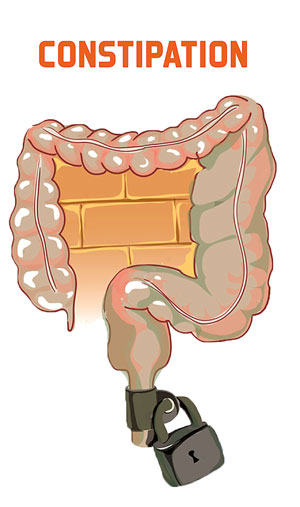20 Oct 2017 - {{hitsCtrl.values.hits}}

 Every single person at one time or another have experienced the uncomfortable condition called constipation. Constipation is especially a frequent complaint among elders. In addition, this condition is becoming increasingly common among the younger population due to the sedentary lifestyle most of them are leading. Constipation is preventable and can be treated with lifestyle changes. In addition this condition can also be a warning sign for a more sinister underlying cause, in rare cases.
Every single person at one time or another have experienced the uncomfortable condition called constipation. Constipation is especially a frequent complaint among elders. In addition, this condition is becoming increasingly common among the younger population due to the sedentary lifestyle most of them are leading. Constipation is preventable and can be treated with lifestyle changes. In addition this condition can also be a warning sign for a more sinister underlying cause, in rare cases.
Although constipation is medically defined as having less than three bowel movements per week, it depends on the individual. Usually, symptoms of constipation is when a person has infrequent bowel motions and hard stools which are difficult to pass.
How and why
From the moment food enters the mouth, digestion begins. When it reaches the colon, most of it has been digested and many nutrients absorbed into the body. The function of the colon is to absorb water and minerals and propel stools towards the rectum where it’s dispelled through the anus. All these are done involuntarily, meaning that you can’t consciously control the functions of your intestines. But since we usually have control over the external anal sphincter, it’s possible to hold on until the right time.

So, constipation is usually a result of a disturbance during this mechanism. Low fiber diet, Poor hydration and lack of exercise result in reduced gut motility and problems in the nervous system which results in reduced movements and inherent problems in the gastrointestinal(GI) tract. These are some of the causes for constipation. But usually constipation doesn’t have a single cause and can be the result of an overlapping of multiple causes.
For the convenience of diagnosis and treatment, constipation is categorized as acute and chronic. Acute constipation is the sudden onset absence of bowel movement, while chronic constipation is constipation lasting over a long period of time. Both conditions may share similar causes, but there are times when some of the causes may belong to only one category.
Acute constipation may be due to a recent change in lifestyle, like a new drug that you are taking. Some anti hypertensive drugs, antidepressants and anti psychotics, iron and calcium supplements and narcotic pain medications are known to cause constipation as a side effect. Usually, a person who has undergone surgery may have constipation that lasts for a few days due to the effects of anaesthesia. A person, who may have damaged her nerves, supplying the colon and the perineum, may also develop sudden constipation. Another cause may be an obstruction in the GI tract, making it difficult for stools to pass. This will require further investigations in order to diagnose the cause.
Chronic constipation may be due to various causes; long standing illnesses like diabetes and parkinsons, diseases in the GI tract like inflammotory Bowel Disease or Cystic Fibrosis. In older people this condition may be a result of several contributing factors including disease conditions, medication and reduced bowel motility. Chronic constipation, though it may not lead to serious outcomes, nevertheless causes serious morbidity in the areas of his or her social and psycological well-being.
Prevention
Eating fiber-rich food, which aids in increasing the bulk of the stool, makes it easier to pass bowel. Add grams, fruits and vegetables, which have plenty of fibre, to your diet. Avoid fast foods which contain refined ingredients and no fibre. Such foods trigger constipation in addition to their numerous other ill effects.
Drink plenty of water. Do not postpone the urge to defecate because the more time stool is stored in the large intestine, the more water it absorbs back into the body, making stool hard and difficult to expel.
A sedentary lifestyle is a causative factor for constipation. Therefore get adequate exercise regularly.
If your constipation is associated with any recent changes to your lifestyle, like a new medication, mention it to your doctor, so that he can either change the medication or prescribe an alternative medication to counteract it.
Complications
People with constipation are prone to straining while defecating which gives rise to complications like haemorrhoids , which results in painless bleeding. They are also at an increased risk of developing anal fissures, which is associated with very painful defecation. This condition makes the patient reluctant to defecate, making the condition even worse.
Chronic constipation may also lead to a condition called rectal prolapse, which is a part of the rectum protruding out from the anus. Another possible complication is the fecal impaction which is a hard bulk of stool blocking the rectum. This may result in the condition called over-flow incontinence, which is liquid matter leaking out from around the bulky mass, staining the clothes. This can be very embarassing for the patient.
Even more than the complications, what we must be alert to with regard to constipation, especially in acute cases, is the possibility of other underlying causes which give rise to constipation in the first place. The first thing to exclude is colon cancer, which could obstruct the colon and cause constipation. Other causes like Hypothyroidism and depression also lead to constipation.
When to seek treatment
Seek a doctor immediately if you have sudden constipation associated with bloating, vomitting and inability to pass gas, which may be the result of bowel obstruction. In this case, don’t give the patient anything to eat or drink orally since he may need to undergo surgery.
Treatment
Treatment varies according to the cause and factors associated with the patient. Some may simply need a change in lifestyle while others may need laxatives. Laxatives can either be bulk forming agents or stimulants. Bulk forming agents usually draw water into the intestine and soften the stool, while stimulants increase the contractions of the stomach. Even though over the counter laxatives are freely available in pharmacies, using laxatives for a long time, without consulting a doctor, is not advisable because this may result in side effects. The addiction to the drug is one.
23 Dec 2024 1 hours ago
23 Dec 2024 3 hours ago
23 Dec 2024 3 hours ago
23 Dec 2024 3 hours ago
23 Dec 2024 5 hours ago